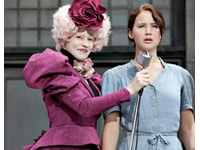Government. Big, oppressive, evil government is what smacks you in the face throughout the film “Hunger Games.”
A war was fought and lost and the government of the winners created a two-class system: Those who are with the government and those who work to sustain it. Our heroine emerges from one of the “districts” that lives in dire conditions. Katniss Everdeen is a skilled hunter and archer, has natural instincts, and has a complicated heart. Jennifer Lawrence (or Raven/Mystique in “X-Men: First Class”) brings depth to the role and makes you appreciate the character. The film feels a little slow in the beginning, but that’s only because the action in the last of the film makes you feel that the writers and directors were trying to wrap this thing up before it hit the three hour mark.
The “Capital” (i.e. the center of the big, bad government) chooses one boy and one girl from each of the 12 districts between the ages of 12 and 18 every year to compete in a battle to the death they call The Hunger Games. Children from privileged districts close to the capital are trained for this event. Those on the outskirts are simply minor obstacles to their victory. The districts must sacrifice two children every year as payment for their previous uprising/war which they lost. Katniss’ younger sister is chosen by raffle to be the representative from District 12 and our heroine throws herself into the ring in her sister’s place — the first volunteer. The clunky beginning gets kicked into high gear when the viewer realizes 24 teenagers will be battling to a gruesome end with only one victor.
The film did one thing very well; anticipation. Having (intentionally) not read the book before watching the film, I was on the edge of my seat waiting for the game to start. Once it started, I was agonizing (in a good way) until the bitter conclusion. The cinematography allows the viewer to take in the actual spectacle that’s occurring: Teenagers are being trotted out in front of cheering spectators clamoring for their death and blood. Some of the competitors arrogantly enjoy it, others recognize their inevitable fate.
But the cinematography has some serious drawbacks:
Lots.
Of.
ShakyCam.
Many shots are composed of a poorly balanced cameraman stumbling through a scene. Often the viewer finds themselves watching what would be an intense struggle to the death but instead sees grass, maybe a blade, grass, hair, grass and then a conclusion with just a giant blur in between. It’s possible some well rehearsed choreography happened, but the viewer would never know it (on more than one occasion). There are also lots of pointless shots of a hand touching a table, the corner of a window, trees, grass and more grass with no subject and no discernable reasoning as to why they weren’t left on the cutting room floor. All of these things can be forgiven because of the compelling and fairly well developed story. The tween-geared plot has the usual eye-roll moments and predictable twists, but the tone of the film — which intentionally doesn’t generate a lot of laughs — helps a grounded adult stay engaged to see what happens next.
At one moment, Katniss does an inspiring act that causes an entire district (not hers) to riot and push back against the government. The President (Donald Southerland) is rightly threatened by our heroine and pressures the “Head Gamemaker,” played by Wes Bentley, to encourage her to come to an untimely end. Woody Harrelson plays a drunken “mentor” to our heroine and her companion/competitor (Josh Hutcherson) from District 12 and manages to deliver every line as if he was just coming out of a hangover. I’m not entirely sure that was intentional throughout the whole film.
If you’re looking to see what all of the hype is about, it’s well worth an outing. I would suggest allowing the droves of teenagers to clear the theaters this weekend and enjoy it on a school night. May the odds be ever in your favor that you don’t have to endure a conversation, like I did, of two teenagers behind you discussing whether or not Sinatra’s first name was “Fred” or “Frank.”
Many will be able to easily see messages of an overbearing government or the dangers of “reality” television. All of these things leave you cheering for the oppressed and being revolted by those who mindlessly follow and benefit from the corrupted empire.
The end of the movie leaves us with a government aware that trouble is brewing within the districts and a strained teen-love that, however overdone, has potential to be a compelling plot to enrich the upcoming films.


COMMENTS
Please let us know if you're having issues with commenting.